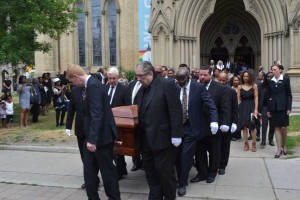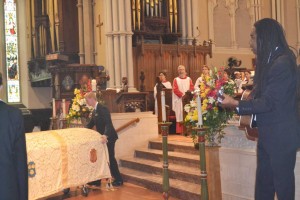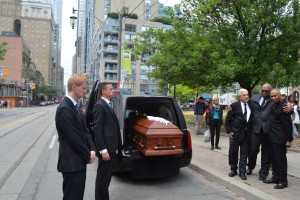 Acclaimed Barbados-born author Austin Tom Clarke who died on June 26 last, was remembered at his funeral last Friday as a man whose life ” defies summation.”
Acclaimed Barbados-born author Austin Tom Clarke who died on June 26 last, was remembered at his funeral last Friday as a man whose life ” defies summation.”
Delivering the eulogy at the Cathedral church of St. James in downtown Toronto, Rinaldo Walcott, an associate professor of sociology and equity studies at the University of Toronto, said of Clarke’s life that ” a summary is too neat…its depth and breath exhaust the idea and practice of summary.”
Walcott noted that “as a writer, journalist, documentarian, professor, politician, man around town, friend, mentor, uncle, cousin, father, lover of all things fine, aficionado of flagrant gins – turned into a cold, dry martini, twist or olives – Austin Clarke was singular.


 “The claim of singular is often given to public figures, overused if you will; but Tom Clarke deserves the appellation.”
“The claim of singular is often given to public figures, overused if you will; but Tom Clarke deserves the appellation.”
Walcott said that Clarke, the winner of numerous literary awards, honorary doctorates and community awards, was ” an intellectual first and foremost, deeply influenced by the French Caribbean anti-colonial thinker and psychiatrist Frantz Fanon. He was a Fanonian. ”
He noted, however, that Clarke’s most important identity was that of a writer.
” Over the course of his career Clarke has published 12 novels from 1964 to 2008. The first novel published in 1964, one year before his beloved Barbados’ independence in 1965. The Survivors of the Crossing, that first novel is in many ways a reminder of not only our middle passage legacy, but of the tenacity necessary for black life to strive in Barbados, in the Caribbean, in the Americas.
” From the first novel to the last novel More, (2008) Austin Clarke has written the story of black life in Barbados, in Canada, in the Americas, as a testament to our survival, creativity and endurance. He himself embodied those qualities.”
“From short stories, to novels, to essays, to memoirs to poems to radio documentaries, and a play or two, Austin has graciously and determinedly written our collective story and returned it to us as an intellectual gift to treasure. He has given us words that we might witness our selves, our lives offered back to us in a fashion, in a style, and in a language that allows us to see our lives and their naked truths revealed to us, as necessary for our life itself.,” said Walcott.
He also noted that Clarke has given ” a tremendous gift of letters to Barbados and the Caribbean.
” He has taken the Caribbean’s language, from his Barbados, with its humour, its quarrel, its performance and even its breathe and rendered it on the page in elegant and exquisite fashion, elevating its rhythms, tones and cadences into an art of narrative and dialogue like no other writer could. ”
“Austin Clarke wrote for us. He wrote so that we might see our selves, our flaws, our joys, our pain, but our pleasures too. He wrote so that we might know we too exist, that we too mattered. But he wrote as well to caution us, to challenge us, to demand something more from us. Austin Clarke wrote for his very life, which is to say he wrote for our very lives too, ” Walcott noted.
At the service there was a reading from one of the passages of Clarke’s novel
More and an acoustic performance of Bob Marley’s ” Redemption Song” and ” No Woman No Cry” by vocalist Julian Taylor.


